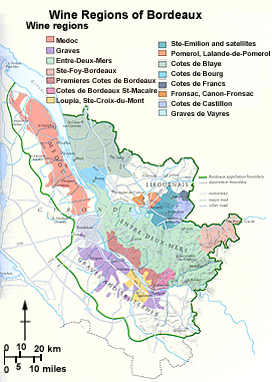| |

Leave the great city of Bordeaux in any direction and you will pass through vineyards. The city is the capital of a wine region that can be fairly described as the most important on Earth. It is not the biggest, but it has arguably the finest red wines, and the finest sweet white ones. Then there is the sheer depth of quality: Bordeaux's vineyards supply copious amounts of good wine, and it is wine with individuality. A wine lover can spend a lifetime exploring the many chateaux of Bordeaux and the appellations into which they fall.
Bordeaux's wines are predominantly red. The white wines fall into two groups: dry from the Graves and other areas, and sweet ones headed by those from Sauternes. The red wines have a distinct flavor: there is more acidity, more liveliness, than in, say, the weightier wines of the Rhone. The personalities of the dominant Cabernet Sauvignon and Merlot grapes show through. While most red Bordeaux show these traits, the best add more: ageing in oak produces an important set of nuances; the finest wines have more concentration, live longer in bottle and evolve in a more complex and a more interesting way. Bordeaux has centuries of experience in making fine wine: the Roman poet Ausonius praised it. The great estates, set on their privileged, gravelly croupes, were established early on (Pape-Clement in 1331). Haut-Brion was the first wine estate to sell its wine under its own name, as a branded product, when its owner had it shipped to London in 1660. The diarist Samuel Pepys, writing just three years later, left us a tasting note for "Ho Bryan', describing it as having "a good and most particular taste that I have never met with", and by the start of the 18th century fine wine, capable of improving as it aged, was born.
For centuries before this, England and other northern countries had been buying wine from Bordeaux. When Eleanor of Aquitaine, heiress to the entire western half of France, married Henry Plantagenet in 1152, England and Bordeaux became married too: an alliance that was to last for three centuries. The medieval English called Bordeaux red wine "claret" (from claret) and drank an average of six bottles a head a year. The name claret - and the habit of drinking it - has lasted in England to this day.
|
|
|


